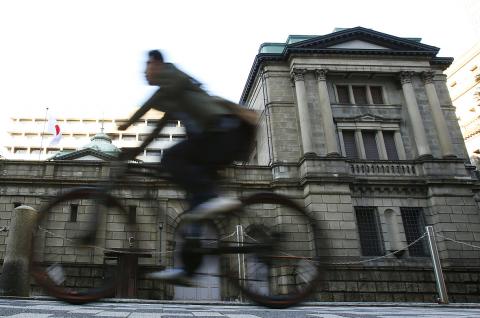Confidence among Japanese manufacturers hit a near three-year low in the final months of this year, a Bank of Japan (BOJ) survey showed yesterday, adding to concerns about the already weak economy.
The central bank’s quarterly tankan survey came just days after official figures showed the world’s third-largest economy shrank in the July-September period, buffeted by a weak global outlook, a strong yen and a spat with China.
It also comes ahead of national polls tomorrow that are expected to see Japanese Prime Minister Yoshihiko Noda ousted in favor of Shinzo Abe, who has promised to press more aggressively for a looser monetary policy.

Photo: Reuters
The worst tankan results since the start of 2010 would likely heap pressure on Japan’s central bank to step up its economic offensive at a policy meeting next week, analysts said.
“Pressure on the Bank of Japan for more monetary easing will inevitably increase,” said Tsuyoshi Ueno, senior economist at NLI Research Institute in Tokyo.
“The survey showed manufacturers are seriously concerned about the economy,” Ueno said.
Sentiment among large manufacturers, including automakers and technology companies, plunged to minus-12 from minus-three in the third quarter. Economists had expected a reading of minus-10.
The survey of more than 10,000 firms shows the percentage of companies saying business conditions are good minus those saying they are bad, and are a key measure used by the BOJ in formulating monetary policy.
“The survey suggested that there remains the risk that the expected economic recovery the BOJ assumes could come even later than the central bank is currently envisaging,” Credit Agricole economist Yoshiro Sato said.
Also yesterday, revised official data showed that Japan’s factory output rose 1.6 percent in October, slightly down from a preliminary 1.8 percent expansion.
The expansion in industrial production data had marked a glimmer of hope among a batch of otherwise gloomy economic figures.
The tankan also offered some positive news, with large Japanese firms planning to boost their capital spending by 6.8 percent on-year through March, suggesting they see a pickup in the economy going into next year.
The index for large, non-manufacturers such as real estate and telecoms firms also stayed in positive territory in the survey.
The BOJ has launched two major policy easing measures since September after its counterparts in the US and Europe also took steps to fight a slowdown in the global economy.
However, critics, notably among them Abe, have called on the BOJ to take a more aggressive stance to spur growth.
Abe, head of the main opposition Liberal Democratic Party and a former prime minister, has repeatedly vowed to press the bank on the issue if he is elected to Japan’s top political job.
Abe’s comments and expectations he will be successful helped send the yen tumbling against the US dollar and the euro.
In forex trade, the US dollar was at ¥83.71, from ¥83.64 in New York late on Thursday. The euro bought US$1.3110 and ¥109.79, against US$1.3073 and ¥109.38 in US trade.
Tokyo stocks finished mixed yesterday ahead of weekend elections. The benchmark Nikkei 225 was flat, dipping 5.17 points to 9,737.56, while the Topix of all first-section shares gained 0.23 percent, or 1.83 points, to 801.04.

Intel Corp chief executive officer Lip-Bu Tan (陳立武) is expected to meet with Taiwanese suppliers next month in conjunction with the opening of the Computex Taipei trade show, supply chain sources said on Monday. The visit, the first for Tan to Taiwan since assuming his new post last month, would be aimed at enhancing Intel’s ties with suppliers in Taiwan as he attempts to help turn around the struggling US chipmaker, the sources said. Tan is to hold a banquet to celebrate Intel’s 40-year presence in Taiwan before Computex opens on May 20 and invite dozens of Taiwanese suppliers to exchange views

Application-specific integrated circuit designer Faraday Technology Corp (智原) yesterday said that although revenue this quarter would decline 30 percent from last quarter, it retained its full-year forecast of revenue growth of 100 percent. The company attributed the quarterly drop to a slowdown in customers’ production of chips using Faraday’s advanced packaging technology. The company is still confident about its revenue growth this year, given its strong “design-win” — or the projects it won to help customers design their chips, Faraday president Steve Wang (王國雍) told an online earnings conference. “The design-win this year is better than we expected. We believe we will win

Chizuko Kimura has become the first female sushi chef in the world to win a Michelin star, fulfilling a promise she made to her dying husband to continue his legacy. The 54-year-old Japanese chef regained the Michelin star her late husband, Shunei Kimura, won three years ago for their Sushi Shunei restaurant in Paris. For Shunei Kimura, the star was a dream come true. However, the joy was short-lived. He died from cancer just three months later in June 2022. He was 65. The following year, the restaurant in the heart of Montmartre lost its star rating. Chizuko Kimura insisted that the new star is still down

While China’s leaders use their economic and political might to fight US President Donald Trump’s trade war “to the end,” its army of social media soldiers are embarking on a more humorous campaign online. Trump’s tariff blitz has seen Washington and Beijing impose eye-watering duties on imports from the other, fanning a standoff between the economic superpowers that has sparked global recession fears and sent markets into a tailspin. Trump says his policy is a response to years of being “ripped off” by other countries and aims to bring manufacturing to the US, forcing companies to employ US workers. However, China’s online warriors